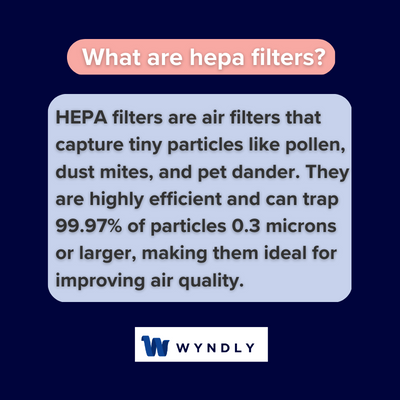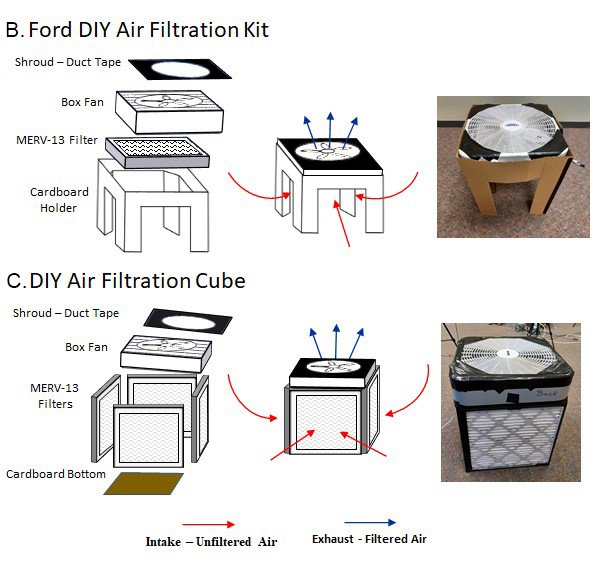HEPA filters can help reduce asthma symptoms. These filters trap tiny particles, improving air quality.
Asthma affects millions, causing breathing issues and discomfort. Clean air is crucial for asthma sufferers. HEPA filters, designed to catch small pollutants, play a key role in this. Understanding the science behind these filters can offer insight into how they work.
It can also help in choosing the right filter for your needs. In this blog, we’ll explore how HEPA filters aid in asthma relief. You’ll learn about their design and effectiveness. This knowledge can empower you to make informed decisions for better health. Stay with us to uncover the science and benefits of HEPA filters in managing asthma.

Credit: cee.engin.umich.edu
Introduction To Hepa Filters
HEPA filters are a popular choice for improving air quality. They are especially beneficial for individuals with asthma. But what exactly are HEPA filters, and how do they work? Let’s dive into the science behind these filters and understand their role in asthma relief.
What Are Hepa Filters?
HEPA stands for High-Efficiency Particulate Air. These filters are designed to capture tiny particles that other filters might miss. According to the U.S. Department of Energy, a HEPA filter must remove 99.97% of particles that are 0.3 microns in size. These particles include dust, pollen, mold, bacteria, and other allergens.
| Particle | Size (Microns) |
|---|---|
| Dust | 0.1 – 5 |
| Pollen | 10 – 100 |
| Mold | 3 – 12 |
| Bacteria | 0.3 – 60 |
How Hepa Filters Work
HEPA filters use a dense mat of fibers to trap particles. When air passes through the filter, particles get caught in the fibers. This process is known as diffusion. The larger particles are captured through interception and impaction.
- Diffusion: Small particles collide with gas molecules and get trapped.
- Interception: Particles follow the air stream and stick to fibers.
- Impaction: Larger particles cannot follow the curves in air streams and crash into fibers.
This multi-layered approach ensures that even the smallest harmful particles are filtered out. By removing these particles, HEPA filters can significantly improve air quality. This is particularly helpful for individuals with asthma. Cleaner air means fewer triggers and better breathing.

Credit: www.wyndly.com
Hepa Filters And Air Quality
HEPA filters play a crucial role in improving air quality. They trap tiny particles that can harm your health. This is especially important for people with asthma. Clean air can help reduce asthma symptoms.
HEPA filters are found in many air purifiers. They work by forcing air through a fine mesh. This mesh captures harmful particles. The result is cleaner, healthier air. Let’s explore more about their impact on indoor air.
Impact On Indoor Air
Indoor air quality can often be worse than outdoor air. Dust, pet dander, and pollen can collect inside your home. These particles can make asthma symptoms worse. HEPA filters help remove these particles from the air. This can make it easier to breathe.
Using a HEPA filter can lower the amount of allergens in the air. This can lead to fewer asthma attacks. It can also improve overall health. Clean air can help you sleep better and feel more energetic.
Pollutants Captured By Hepa Filters
HEPA filters capture many types of pollutants. Dust mites, pollen, and pet dander are common ones. They also trap smoke particles and mold spores. These can be harmful, especially to people with asthma.
HEPA filters are very effective. They can capture 99.97% of particles that are 0.3 microns or larger. This includes many pollutants that can trigger asthma symptoms. Using a HEPA filter can make a big difference in air quality.
Asthma And Airborne Triggers
Asthma affects millions worldwide. Many factors can trigger an asthma attack. Airborne particles, like dust and pollen, are common culprits. Understanding how these triggers work can help manage asthma better.
Common Asthma Triggers
Many things in the air can cause asthma attacks. Dust mites are tiny bugs found in homes. They thrive in warm, humid places. Pollen from trees and flowers is another common trigger. It is especially a problem during the spring and summer.
Pet dander is another major trigger. It comes from the skin, fur, and feathers of animals. Mold spores can also cause issues. They grow in damp areas like bathrooms and basements. Smoke, whether from cigarettes or fires, is a significant trigger too.
Role Of Air Quality In Asthma
Good air quality is crucial for asthma sufferers. Polluted air can make breathing hard. Vehicles and factories release pollutants into the air. These can irritate the lungs.
Inside the home, poor air quality is a problem. Cooking fumes and cleaning products can release harmful chemicals. Even scented candles and air fresheners can be triggers. Using HEPA filters can help. They remove many of these particles from the air.
By reducing these airborne triggers, you can breathe easier. This can lead to fewer asthma attacks and a better quality of life.
Hepa Filters For Asthma Relief
HEPA filters are popular for their ability to capture tiny particles. They are especially beneficial for asthma sufferers. These filters trap dust, pollen, and other allergens. This makes the air cleaner and easier to breathe. Let’s explore how HEPA filters can help reduce asthma symptoms.
Reducing Asthma Symptoms
Asthma is a condition where airways become inflamed. This leads to breathing difficulties. Allergens like dust and pollen can trigger asthma attacks. HEPA filters capture these tiny particles, reducing exposure. This can lead to fewer asthma symptoms.
HEPA filters work by forcing air through a fine mesh. This mesh traps harmful particles. As a result, the air is cleaner. Cleaner air means less irritation for asthma sufferers. This can make a big difference in daily life.
Scientific Studies And Findings
Several studies show the benefits of HEPA filters for asthma relief. A study by the American College of Allergy, Asthma, and Immunology found that HEPA filters reduce allergens in the air. This leads to fewer asthma attacks.
Another study from the Journal of Asthma showed similar results. Participants with HEPA filters in their homes reported fewer asthma symptoms. They also needed less medication. This suggests that HEPA filters can be an effective tool for managing asthma.
| Study | Findings |
|---|---|
| American College of Allergy, Asthma, and Immunology | Reduced allergens and fewer asthma attacks |
| Journal of Asthma | Fewer symptoms and less medication needed |
Using HEPA filters can make a significant difference. They help create a cleaner and healthier living environment. For those with asthma, this can mean better quality of life.
Choosing The Right Hepa Filter
Choosing the right HEPA filter can make a big difference in asthma relief. HEPA filters come in various types and sizes, making it essential to pick the one that best suits your needs. Below are some key points to consider when selecting a HEPA filter.
Types Of Hepa Filters
There are several types of HEPA filters, each with unique features. True HEPA filters are the most effective, capturing 99.97% of particles as small as 0.3 microns. HEPA-type filters are less efficient, trapping 99% of particles of 2 microns or larger. Activated carbon HEPA filters also include a layer of activated carbon to remove odors and gases.
Considerations For Purchase
When buying a HEPA filter, consider the room size. Ensure the filter can handle the air volume of the room. Check the filter’s lifespan and maintenance requirements. Some filters need frequent replacements, while others are washable and reusable. Look for a filter with a high Clean Air Delivery Rate (CADR) to ensure efficient air purification. Noise level is also important if you plan to use the filter in a bedroom or quiet space.

Credit: www.airoasis.com
Using Hepa Filters Effectively
Using HEPA filters effectively is key for asthma relief. Proper placement and regular maintenance ensure that HEPA filters work their best. This section will guide you on how to use HEPA filters to maximize their benefits.
Proper Placement
Place HEPA filters where you spend the most time. Bedrooms and living rooms are ideal. Make sure the filter is away from walls and furniture. This allows better air circulation. Do not block the air intake or outflow. Keep doors and windows closed while the filter is on. This helps keep clean air inside.
Maintenance Tips
Regular maintenance keeps HEPA filters efficient. Check the filter’s indicator for replacement. Most filters need changing every six months. Clean the pre-filter every month. This extends the life of the main HEPA filter. Follow the manufacturer’s instructions for cleaning. Use a vacuum to clean the exterior of the filter. This removes dust and debris that could block airflow.
Additional Benefits Of Hepa Filters
HEPA filters provide a range of benefits beyond asthma relief. These filters can improve air quality in homes and offices. They are especially helpful for those with respiratory issues.
Reduction Of Allergens
HEPA filters trap common allergens like pollen, dust mites, and pet dander. This is crucial for people who suffer from allergies. By removing these particles, HEPA filters reduce allergy symptoms. Cleaner air means fewer sneezes, coughs, and itchy eyes. This leads to a more comfortable living environment.
Improvement In Overall Health
Using HEPA filters can improve overall health. Cleaner air reduces the risk of respiratory infections. It can also lower the chances of developing chronic conditions. People often sleep better in a cleaner environment. Better sleep boosts immune function and mental health. In this way, HEPA filters contribute to a healthier lifestyle.
Future Of Hepa Filter Technology
HEPA filters can greatly help asthma sufferers by trapping tiny particles like dust and pollen. Advances in HEPA technology promise even better air quality. This means fewer asthma attacks and a healthier home.
The future of HEPA filter technology looks promising. New research and development efforts aim to make these filters even more effective. The goal is to improve air quality and provide better asthma relief. Let’s explore the upcoming innovations and potential advancements.Innovations In Hepa Filters
Scientists are working on new materials for HEPA filters. These materials could trap smaller particles than current filters. This would improve air quality in homes and offices. Nanotechnology is another area of focus. It could help create filters with even finer pores. These pores would catch more allergens, dust, and pollutants. This could lead to cleaner, healthier air. There is also interest in smart HEPA filters. These filters could adjust their settings based on air quality. They might use sensors to detect pollution levels. Then, they could increase or decrease filtration as needed. Another innovation is the use of biodegradable materials. This would make HEPA filters more eco-friendly. They would break down naturally after use, reducing waste.Potential Advancements In Asthma Relief
Better HEPA filters could mean fewer asthma attacks. Cleaner air helps reduce exposure to triggers. This includes dust, pollen, and pet dander. New filters could also remove more harmful particles. This includes things like smoke and chemicals. These particles can make asthma symptoms worse. In the future, HEPA filters might also be part of smart home systems. These systems could monitor air quality in real-time. They could alert users when air quality drops. Then, users could take action to improve it. Another potential advancement is portable HEPA filters. These could be used in cars or while traveling. This would help people with asthma breathe easier on the go. Overall, the future of HEPA filter technology looks bright. Innovations and advancements will continue to improve air quality. This will offer better asthma relief and a healthier living environment. “`Frequently Asked Questions
How Do Hepa Filters Help With Asthma?
HEPA filters trap airborne particles, such as dust, pollen, and pet dander. This reduces allergens in the air, helping asthma sufferers breathe easier.
Are Hepa Filters Effective For Asthma Relief?
Yes, HEPA filters are effective in removing common asthma triggers from the air. This can significantly improve indoor air quality and reduce asthma symptoms.
Can Hepa Filters Remove Pet Dander?
HEPA filters can effectively capture pet dander from the air. This helps reduce allergic reactions and asthma symptoms caused by pets.
What Particles Do Hepa Filters Capture?
HEPA filters capture particles as small as 0. 3 microns. This includes dust, pollen, mold spores, and other allergens that can trigger asthma.
Conclusion
Hepa filters offer asthma relief by trapping harmful particles. Clean air means fewer triggers. This helps asthma sufferers breathe easier. Investing in a good Hepa filter can improve indoor air quality. It creates a healthier home environment. Breathing clean air can reduce asthma symptoms.
This simple step can make a big difference. Choose the right Hepa filter for your needs. Enjoy better health and comfort at home.
Rakib Sarwar is a Registered Pharmacist and a reputed health and wellness blogger. He has a great interest in Air purifiers.
